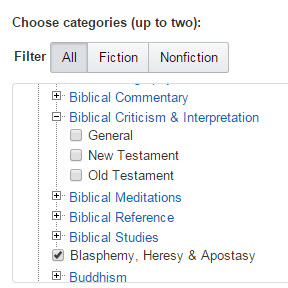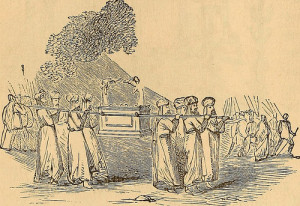A little over a week ago, I was on Amazon’s publishing site entering some details for the release of my book. I was scrolling through the religion subcategories and came across one called “Blasphemy, Heresy, and Apostasy.”
 I chuckled and jokingly considered choosing that category, but I didn’t… not only because I was limited to two categories, but also because many people wouldn’t find it a laughing matter.
I chuckled and jokingly considered choosing that category, but I didn’t… not only because I was limited to two categories, but also because many people wouldn’t find it a laughing matter.
I started thinking about how terms like blasphemy and heresy tend to signal grave concern within the Christian community. They can even evoke fear. And it makes me consider how Jesus responded to the idea of blasphemy.
To be sure, there’s very little mention of blasphemy in the gospels, but the minimal references there are lead me to think that God is far less interested in concerns of heresy and blasphemy than the religious world might think.
In chapter 2 of the Gospel of Mark, there’s a story of a group of men who bring a paralyzed man to a house where Jesus is. There’s such a crowd that the men can’t get to Jesus, so they do the same thing that all reasonable men would do: they dig through the roof, somehow get the paralyzed man up there, and lower him through and into the room where Jesus is.
Now, curiously, the Bible tells us that when Jesus saw their faith – the faith of the men, not the faith of the paralyzed man – he told the paralytic “Your sins are forgiven.”
The fact that we’re specifically told up front that the forgiveness of one man’s sins was the result of the faith of others should clue us in that this is going to be a very thought-provoking story, one that’s likely to challenge some of our ideas about faith, sin, and forgiveness.

Jesus’ statement caused quite a stir among the religious folks present. They started grumbling to themselves, probably because they were a bit obsessed with what their religious traditions had taught them about right and wrong. About sin and forgiveness. Perhaps even about the nature of God and what supposedly incenses God. “Don’t you dare be cavalier about something like sin or forgiveness.”
They were so uptight and so certain that they knew how God felt about all of this that their natural response was “He’s blaspheming!”
But Jesus turns the situation on its ear. And he does so by starting with a question. “Why are you thinking these things?”
Why. Are. You. Thinking. These. Things.?
What “things” is he referring to?
He’s referring to the men’s thoughts of “Who can forgive sins but God alone?” and “He’s blaspheming.”
These actually seem like reasonable thoughts, but if there wasn’t a problem with them, Jesus would have no reason to pose the question to these teachers of the law. But he does. He challenges their understanding of these things. Their understanding of how all of this works.
It’s as though he’s saying “Yeah, this whole sin-and-forgiveness thing that you’re so concerned with and that you think you have figured out? You don’t really know what you’re talking about, so stop getting so uptight. And since I know you’re skeptical because this conflicts with things your faith tradition has taught you about God, let me just validate what I’m telling you by sending this paralyzed man on his way walking, because clearly that would be harder than telling a man his sins are forgiven.”
Boom. Done. Get over it.
And what was their response after the paralyzed man got up and walked away?
They were stunned.
They were amazed.
And they praised God.
Sometimes we need a grenade tossed into our understanding of things. The thing is, I think most of us put a lot of effort into defensively grabbing anything that resembles a grenade and throwing it far away so there’s no chance of it exploding and messing with our orderly little space.
Just like the religious leaders did in this story.
But Jesus made sure they couldn’t. He made sure the grenade exploded right there in the presence of everyone in order to completely decimate their adamant, incorrect beliefs.
And once that happened, they went from being staunch, rigid, and skeptical to being amazed.
If our lives are short on amazement, it might be time to let some grenades explode.





